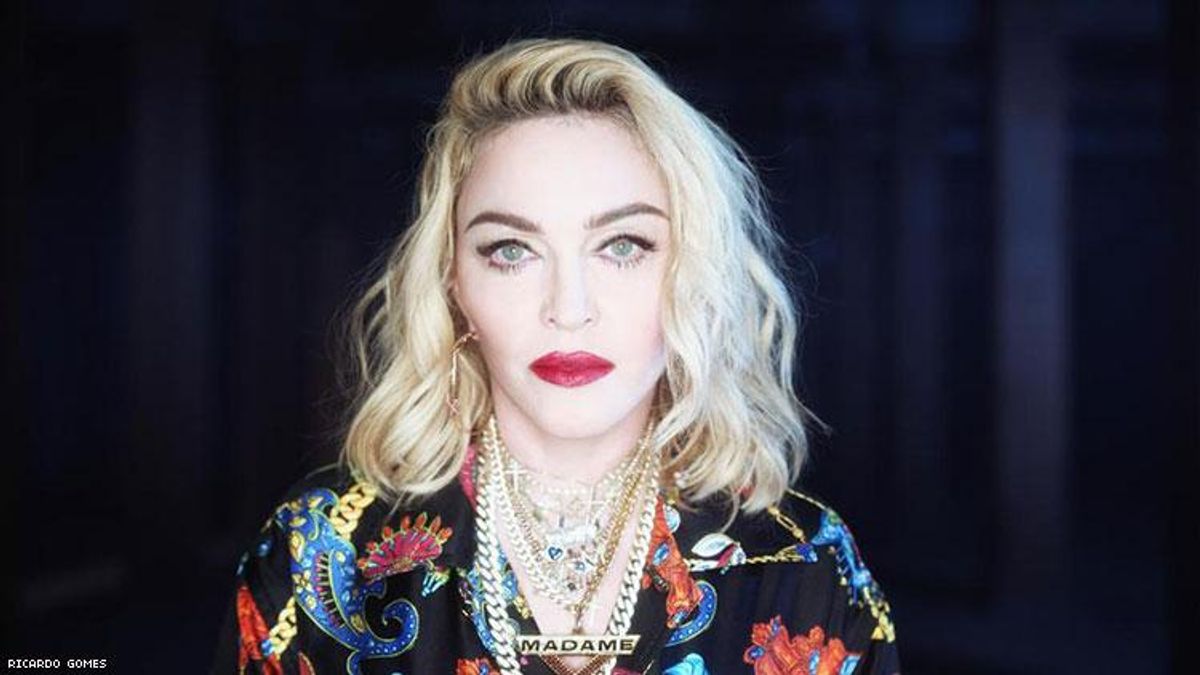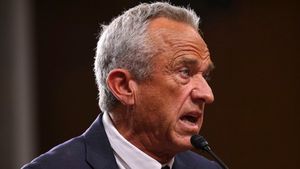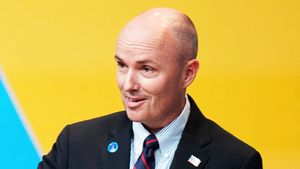Madonna has just said my name and I don't know what to do.
It's a Friday afternoon in New York City, the week before Pride, and I'm on the phone with the Queen of Pop. Her hit single "Medellin" has just gone number one, making it her 47th single to hit that position on the US dance charts. In a few days, Billboard will announce that her fourteenth studio album, Madame X, is her ninth album to reach number one on their 200 chart. A week later, she'll headline New York City Pride.
Yesterday, I was asked to send her a photo. How do you pick a selfie to send to Madonna?
I start our conversation by congratulating her on the success of her new album, an experimental collection of overtly political pop songs ("God Control," "I Rise"), slow burning dance tracks ("I Don't Search I Find"), and stripped back bangers ("Extreme Occident") that sounds like the spiritual successor of Ray of Light and American Life -- if Confessions on a Dance Floor was the godmother. "Madame X is an evolution of everything I've done as an artist," she acknowledges. The icon is extremely demure about the acclaim, saying that even 14 albums in, it's an honor to have her music appreciated. "It's still exciting to have an album be so well received."
With this year's Pride festivities celebrating the 50th anniversary of the Stonewall Riots, there was really no choice but Madonna for the closing performance at Pride Island. The landmark anniversary has the Material Girl reflecting on the history of the movement and speculating on its future. "It means everything to me to be at World Pride," she says. "I'm proud of having been even a small part of fighting for LGBTQ+ equality." But she acknowledges that "even though we have a lot to celebrate, we still have work to do."

Madonna has been doing that work since the early days of her fame -- she famously included information about AIDS in the packaging of her 1989 album Like a Prayer and was vocal in interviews about her support for queer people at a time when that alliance could have derailed her career. That purity of purpose is still evident today on Madame X, which grapples with issues like gun control and political apathy, the latter being something Madonna is clearly not familiar with. In the music video for Madame X track "Dark Ballet," the artist cast queer rapper Mykki Blanco as Joan of Arc, and the video ends with a message from Blanco: "I have walked this earth, Black, Queer and HIV positive, but no transgression against me has been as powerful as the hope I hold within."
The Wednesday before her Pride performance, Madonna released the music video for "God Control," an eight-minute technicolor daydream that slips quickly into nightmare with senseless acts of gun violence happening at a nightclub, a clear homage to the massacre at Pulse in 2016 that claimed 49 lives, most of them queer people of color. "Wake up," Madonna chants over and over, imploring viewers to demand gun control now -- the video even includes a shot of queer activist group Gays Against Guns marching at Pride. "God Control" came complete with a trigger warning about the disturbing content, but advised that these horrors are "happening everyday" and must be stopped. "This is your wake up call," she sings over the track's disco beat.
Pop music, Madonna tells me, is the perfect vehicle for activism "because it's popular. Because people are listening, you're able to get messages across you might not be able to otherwise." She does confess that she wishes more contemporary pop artists would use their platforms to incite change. "I have always been an agent of change." Earlier this year, M (as her team constantly refers to her, something I'm all too happy to pick up -- we're friends now!) rang in the New Year at the Stonewall Inn, compelling revelers to "never forget the Stonewall riots and those who bravely stood up and said 'enough.'" She accepted GLAAD's Advocate for Change Award and delivered a powerful speech about her decades of queer activism. "Why have I always fought for change?" she asked at the time. "It's a hard question to answer. It's like trying to explain the importance of breathing or the need to love."
Hours after I speak with Madonna, Ty Sunderland's monthly pop dance party Heaven on Earth sets sail for a special nautical edition honoring Madonna, a theme Sunderland decided on before he learned the Queen would be performing at Pride. Every time Sunderland dropped a Madonna track, an instant change swept over the crowd. "She has this power that, regardless of your age, you know the song and you love the song," he recalls. "She's one of the ultimate connections for multiple generations of gay people, there's something unifying about her. I can be playing 'Like a Prayer' for a bunch of 20 year-olds or a bunch of 50 year-olds, and everyone is going to be screaming the lyrics."
Drag Racewinner Aquaria was the party's guest DJ -- she showed up in a full Madame X look, which she calls "secret agent prostitute" -- and was struck by the enduring power of Madonna's legacy. "She's this example of bravery and strength," Aquaria says. "She never backed down, she was always fighting for something. She's a woman with extremely strong opinions and, with queer people being a marginalized group, we gravitate towards people who take a stance and want to do good in the world."
That fight is what's inspired Madonna to keep creating music, to keep fighting for change. Her greatest triumph, she reveals, is motherhood. "My children are the most important thing in my life," she insists. And perhaps that's part of why queer people love Madonna so intensely and enduringly. Throughout her career, she's been pop's most striking maternal figure -- after all, she's named after her own mother and one of the most famous mothers in history.
But this is one mother who won't disapprove of your Pride revelry. Before we hang up, I ask Madonna the burning question on everyone's minds: Is Madame X a top or a bottom?
"She's both," she laughs. "I don't like choosing sides."
RELATED | Rejoice: Madonna Will Perform at Pride Island During WorldPride in NYC





















































































